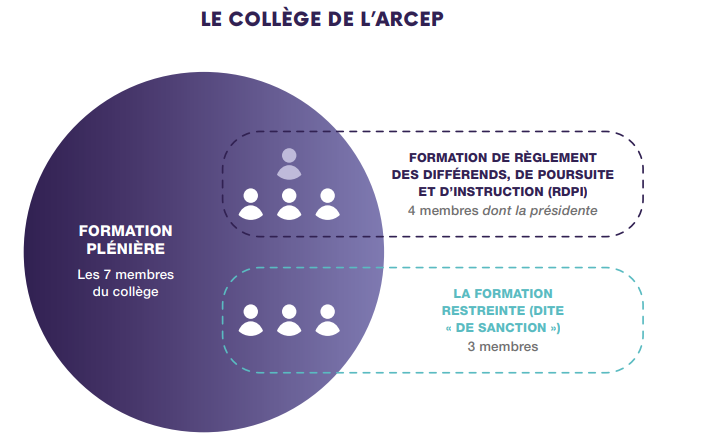In its Decision of 21 April 2023, France’s highest administrative Court, the Conseil d’Etat, decided not to forward the matter of a preliminary ruling on constitutionality to the Constitutional Council (Conseil constitutionnel). It also rejected Orange’s appeal of the Arcep Decision issuing the operator with a formal notice to comply with its fibre rollout commitments in medium-density areas. Arcep welcomes this decision which upholds its Executive Board structure, as well as the process employed and analysis performed to monitor Orange’s compliance with its commitments.
Recap of Orange’s appeal of the Arcep Decision issuing the operator with a formal notice to comply with its fibre rollout commitments in “AMII” areas
In 2018, Orange made binding fibre rollout commitments to provide close to 3,000 municipalities in medium-density areas served by private networks – aka those parts of the country where the Government has issued a call for investment letters of intent (called “zones AMII” in French) – with fibre to the home (FttH) coverage.
Following a request from the Secretary of State responsible for Electronic Communications, and at the outcome of an investigation into the basis of Article L. 36-11 of the French Postal and Electronic Communications Code (CPCE), in its Decision No. 2022-0573-RDPI, the Arcep body responsible for settling disputes, legal proceedings and investigations (RDPI) concluded that Orange had failed to meet the first deadline stipulated in its commitments (of 31 December 2020), and issued the company with a formal notice to “ensure, by 30 September 2022 at the latest, that 100% of the homes and business premises in the municipalities or sections of the municipalities covered by its commitments made pursuant to CPCE Article L. 33-13, in a letter to the Government dated 20 February 2018 and amended by a letter dated 31 May 2018 and accepted through the aforementioned Decree of 26 July 2018, except for those homes and premises for which a refusal was made by the concerned owners or co-owners, be connected or made eligible for connection upon request”.
Orange contested this Decision to the Conseil d’Etat then, several months later, submitted an application for a priority preliminary ruling on the issue of constitutionality regarding Arcep’s power to impose penalties and CPCE Article L33.13 making Orange commitments regarding “AMII” areas legally binding.
The Conseil d’Etat decides not to refer the Orange application for a priority preliminary ruling on the issue of constitutionality to the Constitutional Council
The Conseil d’Etat underscores that “giving an independent administrative authority the power, by Law, to set rules in a specific area and to ensure compliance with those rules, by exercising its power to monitor business activities and to impose sanctions for observed failures to comply, does not contravene the requirements of Article 16 of the Declaration of the Rights of Man and of the Citizen if this sanctioning power is amended in such a way that it ensures respect for the rights of the Defence, the adversarial nature of the procedure and the principles of independence and impartiality”.
In this regard, it deemed that the Law provides for a “functional separation of the functions of prosecution and sanction” within Arcep, and that the Opinion the Authority issued on the proposed commitments that operators made base on CPCE Article L33.13 did not lead the members of its Executive Board to prejudge an operator’s failure to meet its commitments – a matter in which, “if applicable, it would be up to the “RDPI” body […] to assess the steps to take as part of a commitment compliance monitoring procedure”. It concludes that the “claim made based on ignorance of the principles of independence and impartiality imposed on independent administrative authorities in the performance of their duties cannot be considered meaningful”.
The Conseil d’Etat also notes that because the commitments made pursuant to CPCE Article L33.13 were “made freely by operators, putting themselves willingly in a different situation from those that made no such commitments, the claim of infringement on freedom of enterprise and the principle of equality can only be disregarded”.
The Conseil d’Etat upholds the Arcep Decision of formal notice
Confirming the purpose and scope of the commitments made by Orange, the Conseil d’Etat stresses in particular that the company made commitments to “provide coverage to all of the existing premises within a set area, on the scale of each municipality and for pre-determined municipalities, of which it provided the list”. Moreover, it concluded that, to assess compliance with the commitments, Arcep “was not required to use the data produced by the National Institute of Statistics and Economic Studies (INSEE), and which Orange used as the basis for estimating the number of premises eligible for coverage,” and was entitled to “make use of data culled from the exchange file containing enhanced prior information “IPE” files produced by the operators in charge of providing buildings with fibre coverage”.
Furthermore, while recalling that Orange was required to have connected or provided a connection upon request to 100% of the homes and business premises within the area of the municipalities covered by its commitments[1], by 31 December 2020 at the latest, and pointing out that “the company Orange had not met its commitments in a certain number of municipalities”, the Conseil d’Etat upheld the Arcep Decision of formal notice.
Lastly, the Conseil d’Etat delivered a reminder that the formal notices to comply issued by Arcep’s “RDPI” body do not constitute a penalty.
[1] Except those homes and business premises for which the owners refused.

How the Arcep Executive Board works: three distinct bodies to perform Arcep’s different duties
• The Plenary Body which is composed of all seven Board members;
• The body responsible for settling disputes, legal proceedings and investigations (RDPI) which is composed of four of the seven Board members, including the Chair, and which is responsible for opening prior examination procedures, issuing formal notices and notifying grievances;
• The restricted (sanctioning) body, which is composed of the three remaining Board members, and responsible for imposing (or not imposing) penalties.
